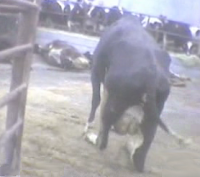 Watching something like this video doesn't lessen my opinion of humanity – I have few illusions on that score. But it does strike me that our orgy of corporate greed, demanded by a billion avaricious investors intent on an ever larger return on investment, impels people to torture animals in this manner. The meat produced from downed animals is declared unsafe for human consumption, but the market's appetite won't stand still for safe and ethical practices. The cows' last hours of pain are stupidly cruel, but the people that are paid $8 per hour to brutalize old, dying factory-farmed cattle must suffer psychological problems, as must their families.
Watching something like this video doesn't lessen my opinion of humanity – I have few illusions on that score. But it does strike me that our orgy of corporate greed, demanded by a billion avaricious investors intent on an ever larger return on investment, impels people to torture animals in this manner. The meat produced from downed animals is declared unsafe for human consumption, but the market's appetite won't stand still for safe and ethical practices. The cows' last hours of pain are stupidly cruel, but the people that are paid $8 per hour to brutalize old, dying factory-farmed cattle must suffer psychological problems, as must their families.So, an aged cow screams; substandard meat is served to hungry schoolchildren; a worker becomes increasingly jaded to inducing eye-rolling bleats of agony; an extra eight percent of profit allows a better return on investment to a private equity fund managing the assets of the increasingly rich (but ever unsatisfied) ruling class, which eats free-range orgasmic Kobe beef and congratulates itself on being so very responsible.
Are you getting enough return on your investment? Maybe it's time to re-balance your portfolio. Call now.
3 comments:
I will personally always enjoy meat, and I totally understand and appreciate where it really comes from. (An animal, not a plastic wrapped packet at the supermarket.)
I too feel that the ethical treatment of animals--even as they head to the slaughter--is key. It's also out of kilter with the big corporate industrial meat industry today.
That's why Becky and I choose to buy all of our meat from our local county farmers--both pork and beef. These are family farms who are selling their meat... meat which is antibiotic/hormone free, free range, and lives happy, humane lives, even up to the slaughter.
We also buy our dairy from organic and small market sources.
We pay more, but we believe we are paying for a better tasting product which is also compatible with our consciences and our local economies.
Good for you, Scott. I don't eat much red meat at all, but I'm totally sure that whatever I do eat is more factory farmed than a head of hydroponic lettuce. And the chicken: well, it certainly isn't ChickieNobs Bucket O'Nubbins that I'm eating. We buy our flesh at Costco, so should I take responsibility.
I don't think I own any factory farms through my mutual funds, but the truth is, I don't even know. It's difficult to even find out, and I think that's a real problem in our system. We bear responsibility for what happens with our money, but our financial system encourages (nay, urges) ignorance and disconnection from the bad behaviour of the companies we invest in.
You can only try to do your best... nothing is perfect.
I really appreciated the farmers that we met when we were in Scotland. They own a highland cow and sheep farm in Granton on Spey, and they augment their income by providing tours.
But when we toured their farm, they explained their concept of "food miles", which means that you want to consume food that has traveled the least number of "food miles", including all stops from farm through processing to dinner plate. This ensures the best outcome for local economies, the freshest product, and the least amount of processing.
It's a neat concept.
They also showed us how they learned to humanely farm. For example, instead of using tasers to get the cows in the truck, they "talk" them in, calling each cow by name. The result is the cows aren't loaded with adrenaline, which affects the cows happiness and also the flavor and tenderness of the meat. They also learned that sheep love to run downhill (god knows why), and that it was easier herding sheep into the truck if they simply parked it in the right way.
It's this attention to the little things that makes such a difference. (And not much cost added.)
I always loved that farm!
Post a Comment